Ricochet is the best place on the internet to discuss the issues of the day, either through commenting on posts or writing your own for our active and dynamic community in a fully moderated environment. In addition, the Ricochet Audio Network offers over 50 original podcasts with new episodes released every day.
 Turkey and the Western Media
Turkey and the Western Media
My doctor, who I visited yesterday to renew a routine prescription, knows I lived in Turkey for many years. As I stood up to leave, he asked me if he could ask my opinion. “The coup in Turkey,” he said earnestly. “Was it real? Or did Erdoğan stage it?”
It suddenly occurred to me how strange my experience of all of this has been. I imagined telling him the truth. “No, he didn’t stage it, and interestingly, your question indicates to me that you — like most people in the West — have been the victim of an extremely sophisticated media and asset-recruitment operation conducted by a powerful, multi-tentacled Islamist cult run out of Pennsylvania, you see, one that’s greatly assisted by the laziness, intellectual weakness, and corruption of the Western media.”
I didn’t say it. I figured he’d reach for the prescription pad and put me on antipsychotics.
But it’s not a psychotic flight of fancy. My belief that it’s not is based on years of personal experience and research. I do appreciate how crazy it sounds to anyone who doesn’t really know Turkey well. But to anyone who does, it’s so obvious that it’s hard to see how anyone could fail to understand this.
This divergence of perception has significant ramifications for the West’s relationship with Turkey. Since the botched coup on July 15, the Gülenists have been working overtime to promote their narrative about it in the West. You can discern their machinations the way you know there’s a submarine under the water from the turbulence in its wake. Example: a Facebook friend who works for a libertarian think tank wrote to me to say, “Claire, I know you’re interested in Turkey — can you help me get the word out about these imprisoned liberal journalists?”
Then she rattled off the names of notorious shills for Gülen. These are the same people who for years worked assiduously to promote the myth that Erdoğan was a liberal reformer, even as Erdoğan and Gülen were presiding over the brisk incarceration of their colleagues, a fact that only a few years ago bothered them not one whit. These same people defended the arrest of journalists who wrote about the Gülenist infiltration of the Turkish state. They eagerly undertook the task of selling these arrests to the West as part of Turkey’s “advanced democratization.”
It’s creepy not only that these people have quickly reinvented themselves as “liberal dissidents,” but that they know exactly who to call to get that message into the Western media. I’ve always read Anne Applebaum’s work on Eastern Europe with interest and respect, for example. But when I read this column, I wondered if I needed to revise that opinion:
On a crackly Skype line from Ankara, Turkey, the story I heard was both new and strangely familiar. I was speaking to an academic, a man with a belief in freedom and free markets, and he was telling me about the arrests, detentions and firings of his colleagues. Sahin Alpay, a 72-year-old liberal journalist with wide European contacts. Orhan Kemal Cengiz, a human rights activist and journalist. Ihsan Dagi, a professor of international relations and theorist of democracy. Lale Kemal, a journalist who writes about the military and security. And there were others.
None of them, he told me, had supported the failed coup in July. None of them were “Gulenists,” followers of the reclusive Islamic cleric, Fethullah Gulen, a Pennsylvania resident whom President Recep Tayyip Erdogan blames for the coup attempt. Some of them had written in the past for a newspaper, now shut down, that Gulen supporters had owned; others had not. What linked them was something different: All of them were “democrats” or “liberals,” in Turkish terms — a category of people whom the Turkish president finds threatening. Liberals have questioned his attacks on the media and judiciary. Liberals have investigated him for corruption. Liberals want to reduce the power of the state that he directs.
Şahin Alpay? A man with a belief in freedom and free markets? He’s a former Maoist who in later years became an outright opportunist, more like it, and he was certainly not arrested because of his “liberalism.” Nor did “liberals” investigate Erdoğan for corruption. The Gülenists in the judiciary did. The people she lists were all house writers at Today’s Zaman, and very much linked by Gülen — as long-time Ricochet readers might even recall from this guide to the Turkish media, which I posted here in 2012:
Zaman is part of the Gülen media empire, and Today’s Zaman should basically be read as the daily newsletter of the Gülen movement, although there is definitely real news to be found in there, sometimes even breaking news – the problem is that you don’t know which part is real, and often, you know for sure that it isn’t. You can tell by the tone, but it takes some getting into the spirit of things. If you read it daily, you’ll begin to get it.
Contrary to reputation, not everyone at Today’s Zaman is a microchip-implanted cult-follower, and there are some hardworking journalists there who do their best to report the news accurately. But the jokes about the paper being Turkey’s Pravda are not for nothing. It’s highly disturbing that Anne-Marie Slaughter didn’t know this …
Cengiz has been set free already. I hope the others end up spending less time in the hoosegow than Nedem Şener and Ahmet Şık did. You’ll also remember Şık’s name if you’re a long-time member of Ricochet, but to refresh your memory, here’s an article I wrote about him at the time:
This brings us to Ahmet Şık, whose book purports to be an account of how the Cemaat [the Gülenists] has infiltrated key organs of the Turkish state, the police in particular. Şık is just one of many journalists arrested in connection with Ergenekon [a now-discredited show trial launched by Gülenist prosecutors]. The prosecutors and their supporters—who overlap to a degree nobody can quite make out with the AKP—emphasize that these journalists have been arrested not for speaking their minds but for aiding and abetting the criminal Ergenekon conspiracy. Unfortunately, the evidence has been kept secret, even from the journalists’ lawyers, except when it has been leaked to newspapers associated with Gülen and splashed all over the front pages, which happens all the time.
Şık’s arrest has at last raised eyebrows even among Turks who had thought the prosecutors knew what they were doing. It was particularly embarrassing when the police began hunting down every copy of the draft of Şık’s unpublished book. The 12th Court for Serious Crimes characterized the draft as an “illegal organizational document” and ruled that anyone who refused to hand in his copy would be accused of “aiding a criminal organization.” Prime Minister Recep Tayyip Erdoğan said that “the written words seized by police posed a serious threat.” Police barged into the offices of the daily Radikal to erase copies from Şık’s colleagues’ computers. When someone predictably released the book on the Internet, Wikileaks-style, the prosecutors threatened to arrest everyone who downloaded it. That won’t be easy: more than 200,000 people have downloaded it so far, including the leader of the main opposition party.
Here’s the way the writers at Today’s Zaman displayed that advertised commitment to democracy and liberalism in 2011. The column below was written by their colleague Mümtazer Türkone after the European Union expressed concern about the banning of Şık’s book (which, again, described the Gülenist’s infiltration of the police), the confiscation of every copy of that book, and the arrest of the author. As anyone who expressed dismay about this would quickly find out, even to suggest that locking up journalists might not be a liberal practice was enough get Today’s Zaman on your case, calling you a naive dupe at best or a coup-plotter at worst:
The confiscation of the book titled “İmamın Ordusu” (The Imam’s Army) was portrayed as a violation of freedom of the press. It was brought up at the European Parliament and it attracted the attention of foreign diplomats in Ankara. All this interest about the recent developments put pressure on the court. The investigation into the organization suddenly turned into a violation of freedom of the press. It appears foreign observers have been influenced by the strength of Ergenekon’s propaganda.
The book penned by Şık with the organizational support and under the supervision of Ergenekon, is circulating on social networking sites. I reviewed the text myself. The book defends the argument that the Ergenekon probe is a conspiracy and blames the police for this. The book defends the claim that police officers generated false evidence to turn some of its opponents into Ergenekon suspects. It then claims that behind this organized police activity is the Fethullah Gülen community. There are no original arguments or information in the book. Similar books have been published in the past. The exposure of the text clarifies why the prosecutor’s office seized the book.
The book is simply a text that disseminates the propaganda of Ergenekon. It is also evidence of the organization’s propaganda power. The only reason the book was of interest to the prosecutor’s office was because the information in the book was related to an organizational activity. Seizing the book means exposing this organization’s activity. By tracking the additions made to the book by various people, the prosecutor aims to shed light on the activities of the organization.
The book does not contain any original information, which shows that the prosecutor’s objective is not to restrict freedom of the press. Likewise, the book can be accessed by everyone on the Internet, which is not something that can be prevented, proving the prosecutor isn’t in pursuit of a ban.
Not much of a robust understanding of the idea of a free press, is that.
Being accused of coup-loving in Today’s Zaman was often your warning that you’d be next to be arrested. Back then, our liberal hero, Şahin Alpay, had this to say of anyone who questioned these arrests: “This ongoing process is an effort to enhance democracy. Those who remain opposed to the Ergenekon investigation include the pro-Israeli Neo-Cons in the U.S.”
These ardent apologists for the practice of arresting journalists are now the very same people appealing to the West (and to “pro-Israel neo-cons” like Applebaum) to defend them on the grounds that they’re “liberal democrats.” Journalists like Applebaum, who obviously weren’t paying attention back then, are for reasons I can’t understand — laziness? It’s not that hard to Google these people, is it? — swallowing the idea that they’re heroes of press freedom.
For years Turks watched the arrest and imprisonment of critics of the government, and for years the Today’s Zaman crown told concerned Westerners they should be in favor of locking up journalists, civil society activists, military officers, heads of football clubs, prominent Kurds, and anyone else who got on the Gülen movement’s bad side, and for years the Western media kept going on about how Turkey was liberalizing and a model democracy for the region. They were locking people up by the hundreds if not thousands on charges everyone with eyes could see were fraudulent. More than once I woke up to the sound of sirens as the cops in my neighborhood hauled off more journalists at dawn.
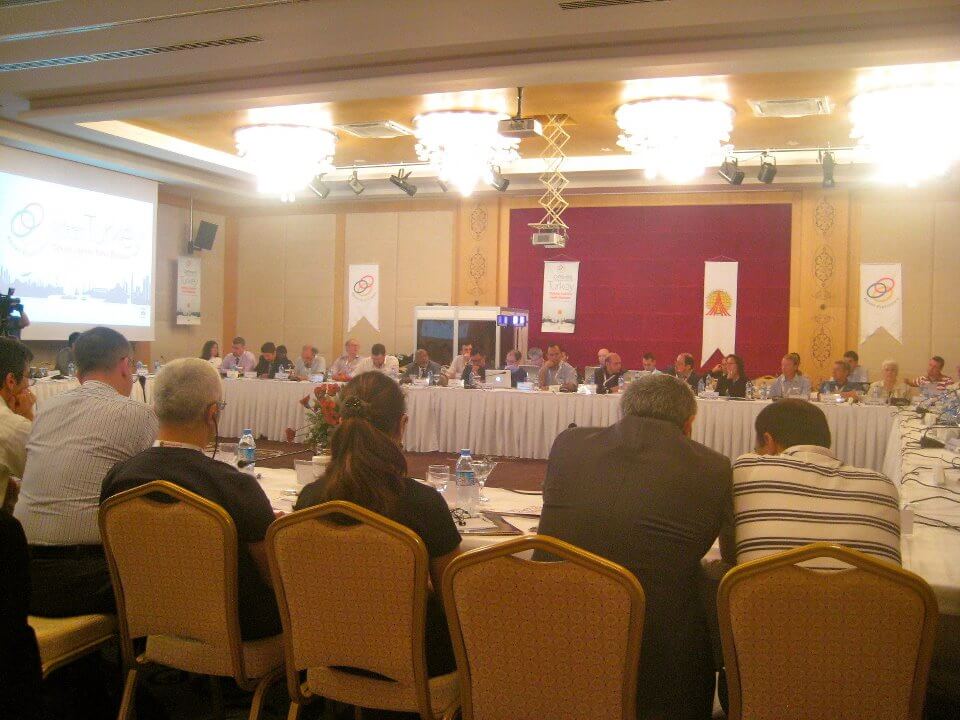
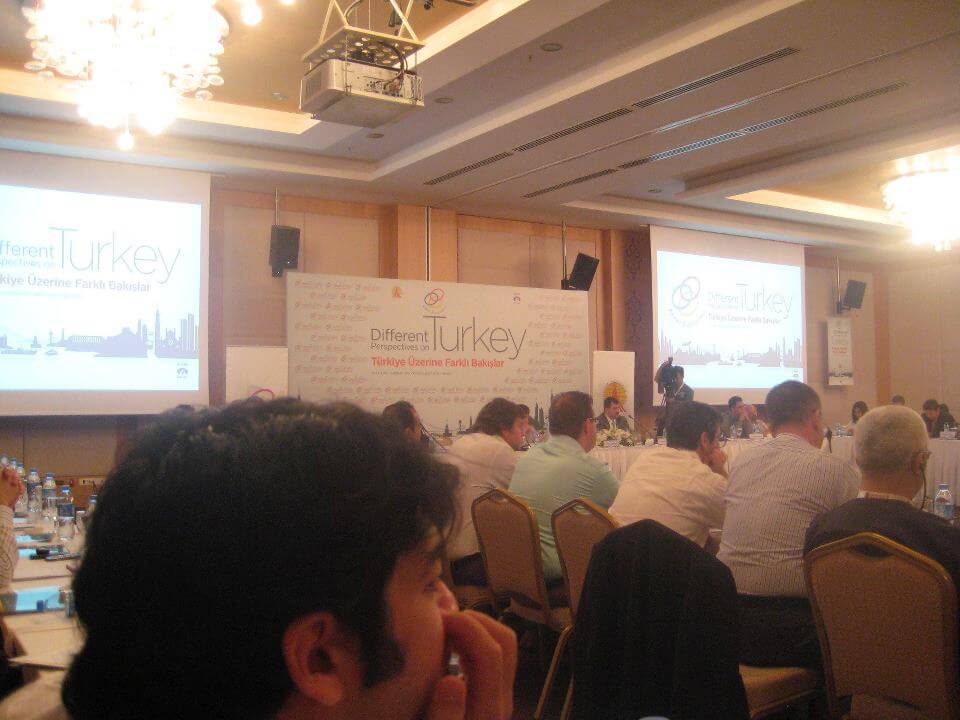 And during this time the leading lights of Today’s Zaman worked incessantly to cultivate American journalists, “experts,” and think tanks and persuade them that Turkey was “democratizing,” and that these arrests were all a natural part of that. They held an annual conference in Abant to which they invited the Westerners they were working on, all expenses paid, to show them how liberal and democratic Turkey was becoming. I went to one, once, because I was curious to know just what happened at these gatherings. (I paid my own way.)
And during this time the leading lights of Today’s Zaman worked incessantly to cultivate American journalists, “experts,” and think tanks and persuade them that Turkey was “democratizing,” and that these arrests were all a natural part of that. They held an annual conference in Abant to which they invited the Westerners they were working on, all expenses paid, to show them how liberal and democratic Turkey was becoming. I went to one, once, because I was curious to know just what happened at these gatherings. (I paid my own way.)
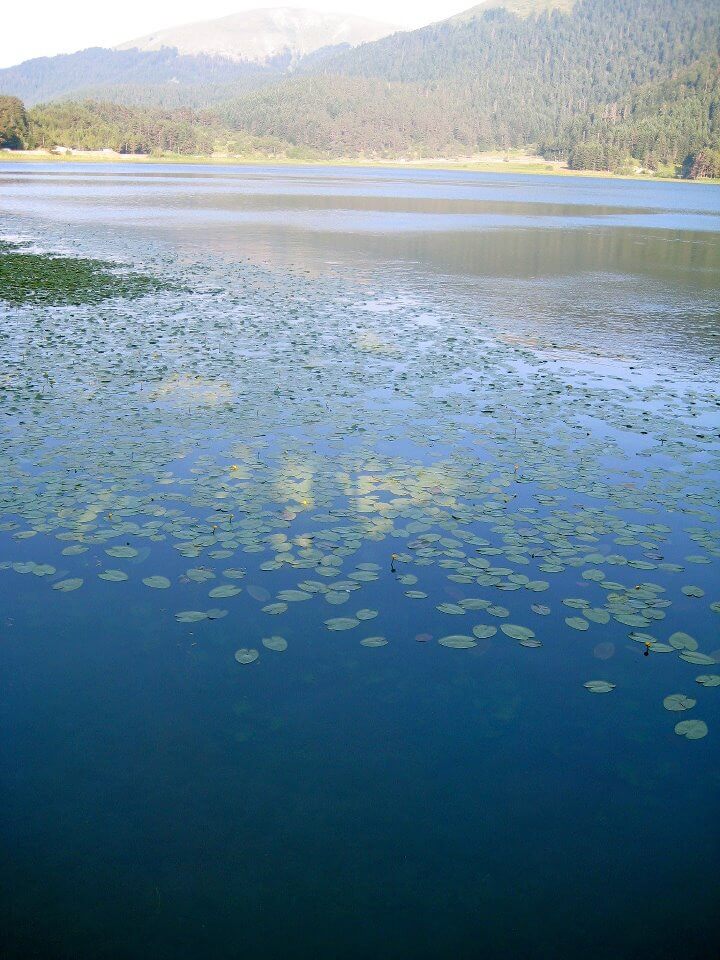 They’d flown out Matt Duss of the Center for American Progress, and a few other people whose names I don’t remember. Abant, as you can see, is gorgeous — who wouldn’t want an all-expenses-paid trip to Abant? Great food, friendly people. Of course the journalists went back home to write tripe about how liberal and democratic Turkey was becoming.*
They’d flown out Matt Duss of the Center for American Progress, and a few other people whose names I don’t remember. Abant, as you can see, is gorgeous — who wouldn’t want an all-expenses-paid trip to Abant? Great food, friendly people. Of course the journalists went back home to write tripe about how liberal and democratic Turkey was becoming.*
At one point that week, after the editor-in-chief of Today’s Zaman delivered a long, happy lecture to the assembled dupes about Turkey’s advanced liberalization and enhanced democratization, I raised my hand and asked how he reconciled this cheerful portrait with the number of journalists languishing in Turkish prisons. It was like a scene from an Old Western where the saloon suddenly goes silent when the gunslinger walks in. He froze. The room instantly went quiet and cold. Afterward, another invitee who knew the score told me I was “very brave” to ask.
Anyway, in the wake of the coup, the Turkish media’s been full of accounts from Gülenist defectors about the methods they use for targeting Western journalists and other people in influential positions. Unsurprisingly, they suggest the contempt the Gülenists have for the “respected” people they recruit this way. In this clip, the host expresses doubt that real journalists would allow themselves to be used so blatantly. You don’t have to understand Turkish to understand his smirk in response:
So you can see why watching the Western media as it suddenly decides the most sinister figures in this story are heroes of liberal democracy drives me berserk. And it drives people in Turkey even more berserk:
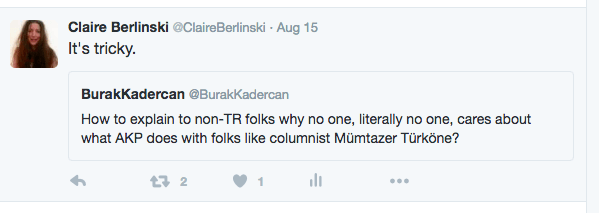

(“TR” is short for “Turkish Republic.” The AKP is Turkey’s ruling party.)
So this brings me to the latest impasse in Turkish-American relations. My colleague Ali Kincal has written a good piece about this: Turkey – U.S. Relations to Collapse over Fethullah Gülen? The Western media keeps churning out pieces about Erdoğan locking up “liberal democrats” as if the West has only just now noticed that Erdoğan’s not a liberal reformer. These articles barely mention Gülen, or the very real coup attempt, no less the mystery of his presence in the United States. Often they seem either to be swallowing the notion that Erdoğan manufactured the coup (which is ridiculous), or dismissive of Gülen’s involvement — as if murdering hundreds of people in the streets and toppling an elected government is no big deal, and something that guests in the United States do all the time:
The country is still staggered by the horror unleashed by the coup plotters that poised to suspend rule of law and democracy, ran over people with tanks, opened fire on civilians from gunships, bombarded the parliament with F-16s and tried to assassinate the country’s president … It is an unprecedented national trauma whose effects will shape Turkey’s future internal and, to some extent, external politics. The country has been politically fractured in the recent years. Yet the coup attempt created an unusual sense of unity among all political parties, civil society and beyond. Their eyes turned to Fethullah Gülen and his movement, the prime suspects of the bloody attempt. If the U.S. fails to read the post-coup attempt mood in Turkey, it will not risk losing only the Turkish government but also the Turkish public. …
The way the U.S. media underemphasizes horrific the coup attempt and how its initiators that took the country’s high command captive and killed their own people on the streets of the capital, and prefers to focus almost solely on Erdoğan is utterly discouraging.
According to PEW polls, Turks are generally suspicious of foreigners and do not see the USA, or any other country, favorably. But given the current circumstances, it is safe to suggest that the coming days have the potential to create a special dislike for the U.S. which could be poisonous for future cooperation. With ISIS continuing to be threat, Middle East being even more unstable than before, and Russian expansionism making a push, Turkish-American relations still hold their high value. Nobody should think to sacrifice them for someone like Fethullah Gülen.
My guess is that official relations between Turkey and the US will remain cooperative. Neither party would benefit from a further deterioration in relations. But from my correspondence with friends in Turkey and from reading the news, I agree that we’re deeply alienating the Turkish public. I would have no problem with alienating the Turkish public if a defensible principle is involved, but in this case, they’re right to be offended. An illegitimate Islamist cult based in Pennsylvania tried to destroy what’s left of Turkish democracy, and the Western media responds by noticing — suddenly — that Turkey is repressive and Erdoğan’s a megalomaniac. But Turkey’s always been repressive and he’s always been a megalomaniac: Why start noticing this now?
Puzzlement about this recently prompted another Turkish interlocutor to ask the questions below:
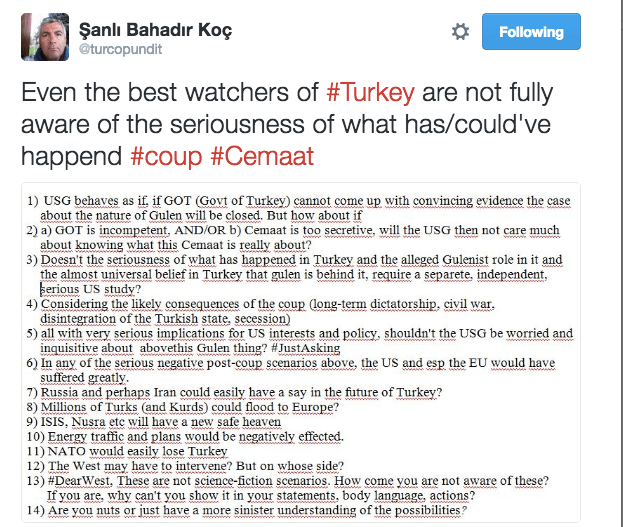
Do you know the answer? I sure don’t.
*********************************
I keep forgetting to put this at the end of my posts. If you’d like to read my book about this and other developments on this side of the Atlantic, please contribute!
*Addendum: Matt Duss saw this and sent me the following e-mail:
Hi Claire,
Someone just sent me your piece, in which you mention my attending the Abant conference, then write “Of course the journalists went back home to write tripe about how liberal and democratic Turkey was becoming.” I actually didn’t publish anything about Turkey after the conference. In fact, the next pieces I did publish about Turkey were: a criticism of Erdogan’s inflammatory anti-Zionist rhetoric, a piece criticizing Erdogan’s response to the Gezi park protests, and a piece criticizing it further, based on reporting from the protests.
Criticism of my analysis and reporting is totally fair and welcome, but your piece suggests that I wrote nice things about Turkey after getting a free trip, which is untrue. I would appreciate you clarifying that in the piece.
Best,
Matt
It’s a fair complaint. The sentence as I wrote it made it sound as if he, in particular, had gone home to write tripe about how liberal and democratic Turkey was becoming. If he says he didn’t, I’ll take his word for it.
Published in General




I don’t know. It looks more like a successful purge than a failed coup.
For people who want more of an introduction to Gülen than the 70,000-odd words I’ve written about him, here’s a documentary that will give you a sense of the scale of the operation. These people are all who they say they are, and I’ve independently verified these and many more claims about the movement:
The scary background music is unfortunate, but don’t be put off by it. This is all to the best of my knowledge consistent with all the other reports we have about Hizmet.
I’ve watched seven minutes of it so far, but it doesn’t seem to be telling me what I want to know. I, too, want to achieve world domination with the help of a large cult of obedient followers, and I, too, am a former school principal and teacher with some experience in the indoctrination of students. I’m not sure I’m going to learn from this video how Gülen is more successful than I have been.
How about a failed coup followed by a purge of the plotters and, not letting a good crisis go to waste, various other targets of opportunity?